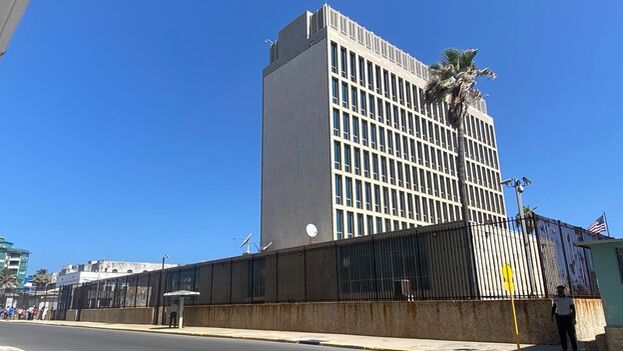
![]() 14ymedio/EFE, Havana, 4 January 2022 — The U.S. embassy in Cuba resumed its consular services for all categories of immigrant visas on Wednesday after a pause of more than five years, during the Donald Trump Administration in the White House.
14ymedio/EFE, Havana, 4 January 2022 — The U.S. embassy in Cuba resumed its consular services for all categories of immigrant visas on Wednesday after a pause of more than five years, during the Donald Trump Administration in the White House.
Interviews for those interested in obtaining a visa for the United State began on December 29.
The announcement was made at the beginning of November, after a meeting in the Cuban capital that included the Deputy Secretary of State for Consular Affairs, Rena Bitter, the director of the U.S. Citizenship and Immigration Services, Ur Mendoza Jaddou, and the Cuban Deputy Minister of Foreign Affairs, Carlos Fernández de Cossío.
Months earlier, Washington explained that visas provide the opportunity for eligible people to apply for a “safe and orderly” migration route.
The resumption of operations comes after a few months of timid rapprochements between Washington and Havana, in which migration has played a central role.
In addition, it has coincided with the largest exodus of Cubans to the northern country in recent history. In the last twelve months, 283,189 Island nationals have been arrested crossing the border between Mexico and the United States; on average, more than 775 per day.
Meanwhile, the U.S. Coast Guard has arrested more than 6,182 Cubans on the coast of Florida from October 1, 2021 until September 30, 2022, when the last fiscal year ended.
The U.S. government issued 23,966 visas to Cubans during that period. Washington complied for the first time since 2017 with the 1994 bilateral immigration agreement, which stipulates the delivery of a minimum of 20,000 visas per year to the citizens of the Island.
Before the resumption at the diplomatic headquarters in Havana, Cubans were forced to carry out immigration procedures in Guyana, which meant an extra economic burden that not many could afford, in addition to facing several irregularities.
At the same time, the U.S. Immigration and Citizenship Services is increasing its staff in Havana to “effectively and efficiently” process cases and conduct interviews.
On September 1, the U.S. embassy in Cuba began processing pending applications for the Cuban Family Reunification Parole Program, suspended since 2017.
The hiatus at the embassy originated after unexplained health problems of American personnel were detected in the legation.
President Trump accused the Cuban government of being responsible for “acoustic attacks” on diplomatic workers on the Island, which he used as a pretext to break the “thaw” that had been driven by his predecessor, Barack Obama (2009-2017) and former Cuban President, Raúl Castro.
Havana, for its part, denied any responsibility in the case and launched a commission of experts that did not find scientific or criminal evidence linking the symptoms with possible sonic attacks, microwaves or other deliberate action.
Over the months, more than 200 U.S. diplomats and officials stationed in half a dozen countries — from Cuba to China, through Austria, Germany and Colombia — reported similar symptoms. Some could not continue exercising their functions.
In January of last year, the U.S. Central Intelligence Agency ruled out that the incidents described were the result of a campaign by an enemy country, as was speculated.
Translated by Regina Anavy
____________
COLLABORATE WITH OUR WORK: The 14ymedio team is committed to practicing serious journalism that reflects Cuba’s reality in all its depth. Thank you for joining us on this long journey. We invite you to continue supporting us by becoming a member of 14ymedio now. Together we can continue transforming journalism in Cuba.
